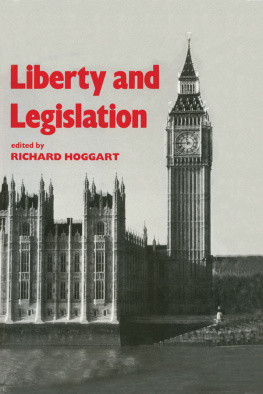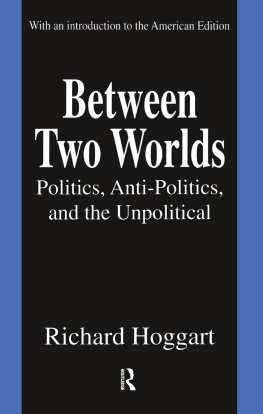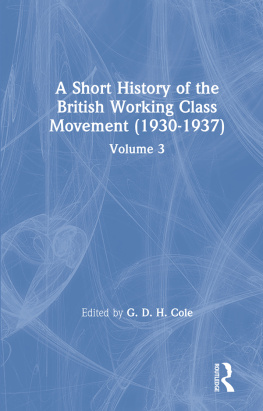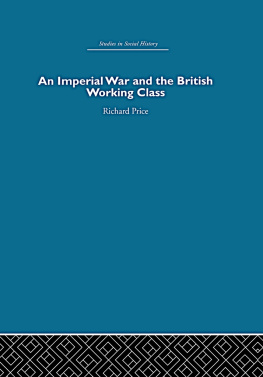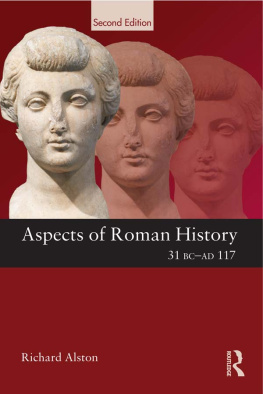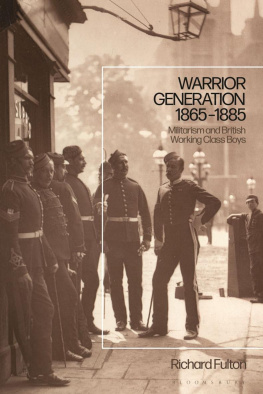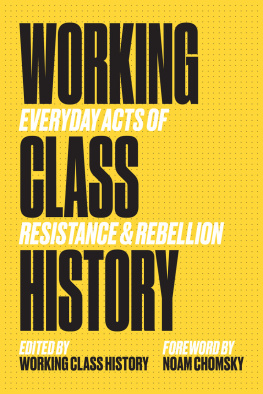Richard Hoggart - The Uses of Literacy: Aspects of Working-Class Life
Here you can read online Richard Hoggart - The Uses of Literacy: Aspects of Working-Class Life full text of the book (entire story) in english for free. Download pdf and epub, get meaning, cover and reviews about this ebook. year: 2009, publisher: Penguin Books, genre: Politics. Description of the work, (preface) as well as reviews are available. Best literature library LitArk.com created for fans of good reading and offers a wide selection of genres:
Romance novel
Science fiction
Adventure
Detective
Science
History
Home and family
Prose
Art
Politics
Computer
Non-fiction
Religion
Business
Children
Humor
Choose a favorite category and find really read worthwhile books. Enjoy immersion in the world of imagination, feel the emotions of the characters or learn something new for yourself, make an fascinating discovery.

- Book:The Uses of Literacy: Aspects of Working-Class Life
- Author:
- Publisher:Penguin Books
- Genre:
- Year:2009
- Rating:5 / 5
- Favourites:Add to favourites
- Your mark:
- 100
- 1
- 2
- 3
- 4
- 5
The Uses of Literacy: Aspects of Working-Class Life: summary, description and annotation
We offer to read an annotation, description, summary or preface (depends on what the author of the book "The Uses of Literacy: Aspects of Working-Class Life" wrote himself). If you haven't found the necessary information about the book — write in the comments, we will try to find it.
The Uses of Literacy: Aspects of Working-Class Life — read online for free the complete book (whole text) full work
Below is the text of the book, divided by pages. System saving the place of the last page read, allows you to conveniently read the book "The Uses of Literacy: Aspects of Working-Class Life" online for free, without having to search again every time where you left off. Put a bookmark, and you can go to the page where you finished reading at any time.
Font size:
Interval:
Bookmark:

Richard Hoggart was born in Leeds in 1918. He served with the Royal Artillery in North Africa from 1940 to 1946, after whichhe taught literature at the University of Hull, was visiting professor of English at the University of Rochester in Americaand senior lecturer in English at the University of Leicester. Professor Hoggart has been a member of numerous bodies andat different times was an Assistant Director-General of UNESCO, Chairman of the New Statesman and Vice-Chairman of the Arts Council. He was Warden of Goldsmiths College, University of London, from 1976 to 1984.
The Uses of Literacy, his most widely acclaimed work, was partly autobiographical and drawn from his own boyhood growing up in the north of England.
Richard Hoggarts son Simon is a journalist with the Guardian.
Lynsey Hanley was born in Birmingham in 1976. She is the author of one book, Estates: an Intimate History, and has written for the Guardian, the Daily Telegraph, the New Statesman, Prospect, the Times Literary Supplement and others. She is an Honorary Research Fellow at Lancaster University.
Aspects of Working-Class Life
with a Foreword by Simon Hoggart
and an Introduction by Lynsey Hanley

PENGUIN BOOKS
IN ASSOCIATION WITH
CHATTO & WINDUS
PENGUIN CLASSICS
Published by the Penguin Group
Penguin Books Ltd, 80 Strand, London WC2R 0RL , England
Penguin Group (USA) Inc., 375 Hudson Street, New York, New York 10014, USA
Penguin Group (Canada), 90 Eglinton Avenue East, Suite 700, Toronto, Ontario, Canada M4P 2Y3 (a division of Pearson Penguin Canada Inc.)
Penguin Ireland, 25 St Stephens Green, Dublin 2, Ireland (a division of Penguin Books Ltd)
Penguin Group (Australia), 250 Camberwell Road, Camberwell, Victoria 3124, Australia (a division of Pearson Australia Group Pty Ltd)
Penguin Books India Pvt Ltd, 11 Community Centre, Panchsheel Park, New Delhi 110 017, India
Penguin Group (NZ), 67 Apollo Drive, Rosedale, North Shore 0632, New Zealand (a division of Pearson New Zealand Ltd)
Penguin Books (South Africa) (Pty) Ltd, 24 Sturdee Avenue, Rosebank, Johannesburg 2196, South Africa
Penguin Books Ltd, Registered Offices: 80 Strand, London WC2R 0RL , England
www.penguin.com
First published by Chatto & Windus 1957
Published in Pelican Books 1958
Reprinted in Peregrine Books 1984
Reprinted in Penguin Books 1990
Reprinted with additional material in Penguin Books 1992
Published in Penguin Classics with a new Introduction and Foreword 2009
Copyright Richard Hoggart, 1957
Interview with Richard Hoggart reprinted with kind permission from John Corner,
Studying Culture: Reflections and Assessments, Media, Culture and Society, Vol. 13.
Copyright Sage Publications Ltd, 1991
Foreword copyright Simon Hoggart, 2009
Introduction copyright Lynsey Hanley, 2009
All rights reserved
The moral right of the author has been asserted
Except in the United States of America, this book is sold subject to the condition that it shall not, by way of trade or otherwise, be lent, re-sold, hired out, or otherwise circulated without the publishers prior consent in any form of binding or cover other than that in which it is published and without a similar condition including this condition being imposed on the subsequent purchaser
ISBN: 978-0-14-119180-5
The Uses of Literacy was first published in March 1957. The Hoggart family were then all living in Rochester, New York, where Dad had gone ona years exchange programme involving the University of Hull, at which he then taught English. Heaven knows what the Americansmade of that fabled city on the Humber, where rationing had not yet fully ended, where the smell of fish sometimes permeatedthe whole city, and where the bomb sites seemed to stay empty for ever. In me, the experience of going in the opposite directionbred a lifelong love of the United States, its warmth, its energy, its beauty, and for a ten-year-old boy, its food. Dad waspaid his British salary, a pittance in the States, but he and my mother managed to take me, my brother and sister around muchof the country, or at least the east coast: Washington, Virginia, the Adirondacks, New York, New England and into Canada.We went everywhere in an old two-tone De Soto, one of the last American cars to be shaped like a toad rather than a coffin.Incredibly to us, American cars had radios. Elvis had just arrived and Mum predicted he would be forgotten in no time. Shehas already outlasted him by more than three decades.
Dad had left the MS of Uses with Chatto & Windus in London. It had been a difficult and worrying publication. One of the best-remembered parts of thebook is the sustained attack on pulp fiction and tabloid journalism, illustrated by extracts and accompanied by a pejorativecommentary. Chatto employed a lawyer who warned that this was all actionable. A sum of one million pounds in damages was mentioned a lot of money now, an unimaginable sum then. Short of ditching the entire section, the only way round the problem was for Dad to make up the kind of thing he was writing about and lay into that.
It didnt take long, and he clearly enjoyed the task. He specially enjoyed inventing the titles of the sex and crime novels.One of them had an intriguing afterlife. He called it Death Cab For Cutie, which has a certain ring. Someone in the Bonzo Dog Doo Dah Band, the comedy rock group, must have read the book and likedthe title, so he wrote a song around it. There is a curious moment in the Beatles TV film Magical Mystery Tour when the band performs the song in a sleazy strip club. (The late Derek Taylor, the Beatles PR, once told me that GeorgeHarrison had admired Dads work.) Then a west coast American group must have heard the song and chose it for their own name.The band Death Cab For Cutie became a cult success, and included among their greatest fans my own son, also called RichardHoggart. In such a way do jokes cascade down the generations.
We returned on the Empress of Britain in summer 1957. (The previous year we had gone out on the old Queen Elizabeth; it was the last year more people crossed the Atlantic by sea rather than air.) We found that The Uses of Literacy had become a considerable success. (It was already into its third printing two months after publication.) It was, for a certaintype of person and class, a book that had to be read. One of its admirers was Tony Warren, who invented Coronation Street, and who later told Dad that the book had shown him that it was possible to write rich and eventful drama about working-classlife. In fact, working-class life was rarely on our screens then except in the form of Lor bless you guv cockneys or stalwartNorthern squaddies or else in occasional documentaries in which middle-class people expressed kindly concern at the povertyand squalour. And W. H. Auden, the subject of Dads first book, liked it a lot and sent a long letter.
Dad started to be on television not a big deal now that there is so much TV that few are spared from appearing on it. Inthose days it was a source of huge pride and excitement, even though many people didnt have a set. I can recall the neighbourscramming into our living room to see him appear on some earnest early Sunday evening inquiry into education.
It led directly to the next great excitement: the
Font size:
Interval:
Bookmark:
Similar books «The Uses of Literacy: Aspects of Working-Class Life»
Look at similar books to The Uses of Literacy: Aspects of Working-Class Life. We have selected literature similar in name and meaning in the hope of providing readers with more options to find new, interesting, not yet read works.
Discussion, reviews of the book The Uses of Literacy: Aspects of Working-Class Life and just readers' own opinions. Leave your comments, write what you think about the work, its meaning or the main characters. Specify what exactly you liked and what you didn't like, and why you think so.

